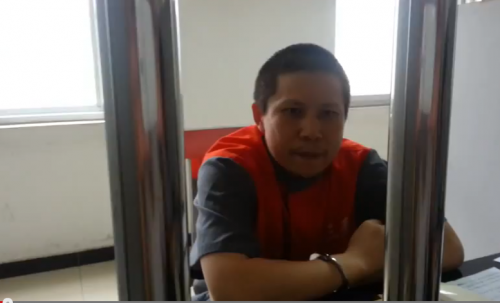Civil society and anti-corruption activist Xu Zhiyong was sentenced to four years in prison on Sunday. The judgment, he told the court, “wiped out the Chinese legal system’s last shred of dignity.” From Simon Denyer at The Washington Post:
His indictment had accused him of organizing and inciting people to unfurl banners, distribute leaflets, attract onlookers, make a racket and obstruct police officers from enforcing the law during a series of small protests in 2012 and 2013.
“Xu Zhiyong was very moderate, and was accused of bending over backwards to meet the other side,” said Maya Wang of Human Rights Watch. “This heavy sentence will be seen as a slap in the face for that group of activists who have tried to put out a moderate message.”
[…] Xu, 40, had refused to mount a defense at the trial, which he said had been rigged. When Xu tried to read aloud a closing statement on Wednesday, the judge interrupted him after about 10 minutes to say his comments were “irrelevant,” according to Zhang [Qingfang, one of Xu’s lawyers]. Foreign diplomats and journalists were barred from the trial. [Source]
See more on Xu’s trial and closing statement via CDT. As at the trial, where tight control had been ordered in a leaked Domestic Security Department notice, there was a heavy security presence surrounding the courthouse. After speaking with reporters nearby, Zhang Qingfang was taken away by police, but released once the media had dispersed.
Police preventing Xu Zhiyong's lawyer, Zhang Qingfang, from speaking to the media. pic.twitter.com/pFHTCWebXh
— Sui-Lee Wee 黄瑞黎 (@suilee) January 26, 2014
Online, on the other hand, Fei Chang Dao noted that Sina lifted a block on Weibo searches for Xu’s name within minutes of the verdict, continuing a pattern of information control around the case.
The U.S. Embassy and European Union delegation to China both expressed concern for Xu. Amnesty International described the verdict against him as “shameful”, while Human Rights Watch argued that Xu’s trial and punishment is out of step not only with Beijing’s pledges to battle corruption, but also with its recently announced judicial reforms:
“The harsh sentence for a moderate critic who reflected widespread public concern about corruption shows just how little tolerance there is towards dissent in China today,” said Brad Adams, Asia Director. “Xi Jinping has made fighting corruption the linchpin of his presidency, but when an average citizen takes up the same cause, he is sent to prison. This hypocrisy makes a mockery of the president’s anti-corruption campaign.”
[…] In November 2013, the Supreme People’s Court issued a document instructing courts to take steps to reduce miscarriages of justice. Courts must not make judgments because of “pressure to maintain stability,” ensure trials are open to the public, and ensure the defense has the right to cross-examine witnesses. The conduct of Xu’s trial suggests these instructions were overridden.
[…] “Instead of ‘putting power’ within a ‘cage of regulations’, as Xi Jinping has promised, the new leadership appears to be more interested in consolidating power,” Adams said. “Staging show trials of critics is wholly at odds with Xi’s self-proclaimed reformist agenda.” [Source]
HRW’s Phelim Kine wrote on Saturday that Xu’s activism had been vindicated by recent ICIJ reports on Chinese elites’ offshore financial holdings.
Two other members of Xu’s New Citizens’ Movement were tried on Thursday, though one, Zhao Changqing, aborted the proceedings by sacking his lawyers in protest. Four more trials are scheduled for Monday.








